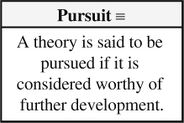Difference between revisions of "Theory Pursuit (Barseghyan-2015)"
m (Hakob Barseghyan moved page Pursuit (Barseghyan-2016) to Theory Pursuit (Barseghyan-2015) without leaving a redirect) |
Revision as of 17:02, 15 October 2016
This is a definition of Theory Pursuit that states "A theory is said to be pursued if it is considered worthy of further development."
This definition of Theory Pursuit was formulated by Hakob Barseghyan in 2015.1 It is currently accepted by Scientonomy community as the best available definition of the term.
Contents
Scientonomic History
Acceptance Record
| Community | Accepted From | Acceptance Indicators | Still Accepted | Accepted Until | Rejection Indicators |
|---|---|---|---|---|---|
| Scientonomy | 1 January 2016 | The definition became de facto accepted by the community at that time together with the whole theory of scientific change. | Yes |
Question Answered
Theory Pursuit (Barseghyan-2015) is an attempt to answer the following question: What does it mean to say that a theory is pursued? How should theory pursuit be defined?
See Theory Pursuit for more details.
Description
Traditionally, the terms acceptance, use, and pursuit have not been distinguished. Confusion between the three terms leads to serious misunderstanding, thus their clarification is of great importance. 1p. 30
Reasons
No reasons are indicated for this definition.
If a reason supporting this definition is missing, please add it here.
Questions About This Definition
There are no higher-order questions concerning this definition.
If a question about this definition is missing, please add it here.
References
- a b c d e Barseghyan, Hakob. (2015) The Laws of Scientific Change. Springer.
- a b Hume, David. (2000) A Treatise of Human Nature. Oxford University Press.
- ^ Lakatos, Imre. (1970) Falsification and the Methodology of Scientific Research Programmes. In Lakatos (1978a), 8-101.
- ^ Lakatos, Imre. (1978) Philosophical Papers: Volume 1. The Methodology of Scientific Research Programmes. Cambridge University Press.
- a b Laudan, Larry. (1977) Progress and Its Problems. University of California Press.
- a b Wykstra, Stephen. (1980) Toward a Historical Meta-Method for Assessing Normative Methodologies: Rationability, Serendipity, and the Robinson Crusoe Fallacy. PSA: Proceedings of the Biennial Meeting of the Philosophy of Science Association, 211-222.
- ^ Castelvecchi, Davide and Witze, Alexandra. (2016) Einstein's Gravitational Waves Found at Last. Nature. Retrieved from https://www.nature.com/news/einstein-s-gravitational-waves-found-at-last-1.19361.
- ^ Abbott, Benjamin. (2016) Observation of Gravitational Waves from a Binary Black Hole Merger. Physical Review lettters 116, 061102. Retrieved from https://journals.aps.org/prl/abstract/10.1103/PhysRevLett.116.061102.
